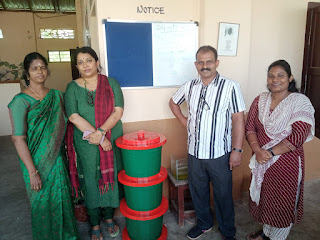Bio-bin: A commendable step towards sustainable waste
management
Department
of Botany & Zoology
January
24, 2024
The
initiative to set up a Bio-bin at the department of Botany & Zoology is a
commendable step towards sustainable waste management within the college
premises. This bio-composting system aims to convert food waste into useful
compost, thereby addressing the challenge of food waste disposal.
The
apparatus, consisting of three aerobic buckets arranged vertically with
airtight lids in between, demonstrates a thoughtful design. The bottom-most
lid, designed to hold water and inverted to prevent ant entry, reflects
attention to detail in managing potential challenges associated with
composting. Ants are often attracted to food waste, and by creating a barrier
with an inverted lid filled with water, the bio-bin aims to deter their entry.
The
inclusion of coir pith as an inoculum to accompany each lot of food waste is a
strategic move. Coir pith not only aids in the absorption of excess water but
also contributes to the composting process by providing a suitable medium for
microbial activity. This addition helps balance the composting environment and
ensures optimal conditions for decomposition.
The
rotation of the buckets once the topmost is filled to capacity is a practical
approach to continuous composting. This method allows for a systematic and
efficient composting process, ensuring that the decomposition of food waste is
ongoing. The anticipation of obtaining complete bio-compost within 45 days is
an optimistic and achievable goal, provided the monitoring and rotation
processes are diligently maintained.
Assigning
two students from each year (first to third year) to regularly monitor the
bio-bin is an excellent example of involving students in practical, hands-on
environmental initiatives. This not only educates them about waste management
but also fosters a sense of responsibility towards sustainable practices. The
success of this initiative could indeed serve as an effective solution to the
food waste menace within the college, setting a positive example for other
institutions to follow.


.jpeg)






No comments:
Post a Comment